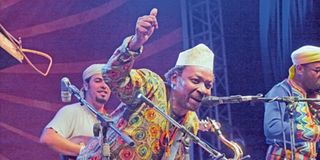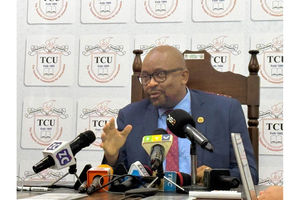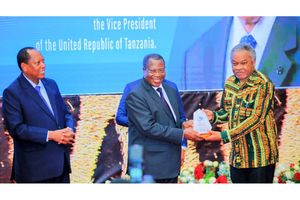Journalists blamed over poor coverage of traditional music

What you need to know:
Performing a string of hits at the 2017 edition of the Sauti za Busara on the opening night, Paul Ndunguru, the band’s lead singer told The Citizen that the status quo at the market place didn’t support sustainability of traditional music in the country.
Zanzibar. Ten years after Wahapahapa Band was formed with a unique identity that defined their music, wining them a huge international fan base, the band is yet to release an album.
Performing a string of hits at the 2017 edition of the Sauti za Busara on the opening night, Paul Ndunguru, the band’s lead singer told The Citizen that the status quo at the market place didn’t support sustainability of traditional music in the country.
During his one hour performance at Ngome Kongwe, it was full house with most of those in attendance being tourists from mainly European countries. Songs like Kipanga, Chabure, Ali Jojo, Dunia, Mapanya and Asumani Anamung’unyula were great numbers that attracted revellers to join them on the Busara stage.
“There is not enough infrastructure in terms of facilities that can adequately record these traditional instruments to meet the desired quality that is why they have put the release of two albums on hold,” he said. According to Ndunguru, their journey in music has mainly involved research over the years into the diversity of Tanzanian music which form the backbone of their work.
“Unlike other countries where there are a few tribes, Tanzania has over 120 ethnic groups with each having a different unique set of traditions,” he explained.
He said though this diversity could be a distraction at some point it forms a great wealth from which they have created their songs in the last decade, an anniversary they celebrated on the same stage that catapulted them to stardom.
But despite the rich taste and being a hit at foreign gigs that has been part of their journey they are yet to be celebrated at home.
“We rarely get gigs locally apart from a few isolated events when we perform at corporate and diplomatic shows, there isn’t much going on locally for traditional music,” said Ndunguru.
He attributed this lack of desire in the domestic arena to the heavy influence of Bongo Flava which has been greatly promoted by the media.
“The whirlwind growth of Bongo Flava has been due to media influence. The same token hasn’t been extended to traditional music performers because there are things that we have taken for granted yet it is what explains who we are as a people,” he told The Citizen.
He cited the recent rise of the Mchiriku as a genre due to promotion that has greatly made headlines with artistes such as Manfongo making successful debuts that made them household names.




